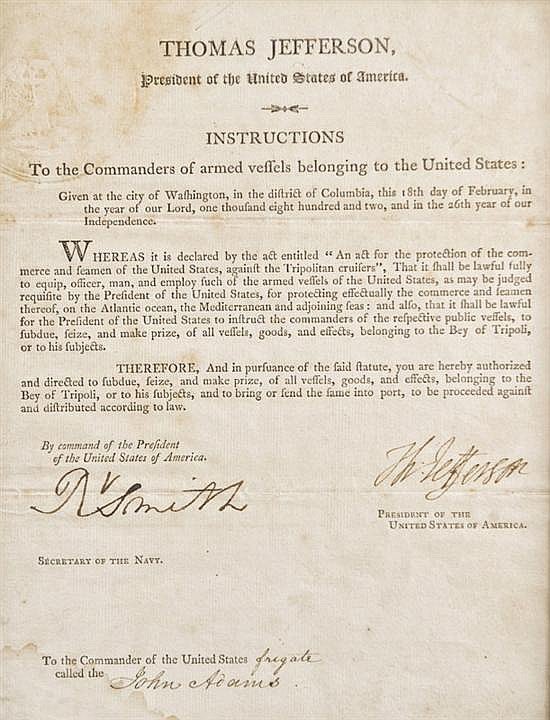2/ Letters of marque and reprisal are government-issued commissions that authorize private citizens (privateers) to perform acts that would otherwise be considered piracy, like attacking enemy ships during wartime
Privateers are rewarded with a cut of the loot they “bring home”



Privateers are rewarded with a cut of the loot they “bring home”




3/ Legal Basis in the U.S.
The U.S. Constitution authorizes these commissions in Article I, Section 8, giving Congress the power to “grant Letters of Marque and Reprisal”
While Congress hasn’t issued one in over a century, the authority to do so still exists
The U.S. Constitution authorizes these commissions in Article I, Section 8, giving Congress the power to “grant Letters of Marque and Reprisal”
While Congress hasn’t issued one in over a century, the authority to do so still exists

4/ Modern Context: Mexican Drug Cartels
Using letters of marque could be a novel, but effective response to unique threats posed by drug cartels—especially in response to threats by the cartels to target U.S. planes returning illegal immigrants to their countries of origin

Using letters of marque could be a novel, but effective response to unique threats posed by drug cartels—especially in response to threats by the cartels to target U.S. planes returning illegal immigrants to their countries of origin


5/ How Could They Be Applied?
- Authorization: Congress could issue letters of marque and reprisal authorizing private security firms or specially trained civilians to intercept cartel operations, particularly those involving drug shipments or human trafficking across borders
- Targets: Focus on disrupting supply lines, capturing high-value targets, or seizing assets like boats, vehicles, cash, gold, or equipment used in criminal activities
- Authorization: Congress could issue letters of marque and reprisal authorizing private security firms or specially trained civilians to intercept cartel operations, particularly those involving drug shipments or human trafficking across borders
- Targets: Focus on disrupting supply lines, capturing high-value targets, or seizing assets like boats, vehicles, cash, gold, or equipment used in criminal activities

6/ Advantages
- Flexibility: Private entities operate with more agility than the government, adapting quickly with the tactics of cartels
- Cost: Would reduce the financial burden on taxpayers, as privateers receive only a cut of what they recover & return to the U.S.
- Flexibility: Private entities operate with more agility than the government, adapting quickly with the tactics of cartels
- Cost: Would reduce the financial burden on taxpayers, as privateers receive only a cut of what they recover & return to the U.S.

7/ Criticism
The use of letters of marque and reprisal would undoubtedly draw criticism, especially from those inclined to elevate abstract, often-inchoate principles of what they deem “international law” above the sovereign interests of the United States
The use of letters of marque and reprisal would undoubtedly draw criticism, especially from those inclined to elevate abstract, often-inchoate principles of what they deem “international law” above the sovereign interests of the United States

8/ Dismissing the possible use of letters of marque to combat Mexican drug cartels—either on the basis of “international law” or otherwise—overlooks the clear and present threat posed by those cartels to the U.S.
This could prove to be an effective alternative to war

This could prove to be an effective alternative to war


9/ We have no desire to go to war with our southern neighbor
But we also can’t ignore the fact that drug cartels are now threatening to target U.S. planes deporting illegal aliens
That sounds like a great reason to consider issuing letters of marque and reprisal
But we also can’t ignore the fact that drug cartels are now threatening to target U.S. planes deporting illegal aliens
That sounds like a great reason to consider issuing letters of marque and reprisal

10/ Letters of marque and reprisal have worked well for the U.S.—and countless other countries—in the past
We’d be wrong not to consider using them against the cartels

We’d be wrong not to consider using them against the cartels


11/ Please share if you like this idea—and follow if you’d like to see more posts about letters of marque and reprisal & other amazing, little-known features of the U.S. Constitution 

• • •
Missing some Tweet in this thread? You can try to
force a refresh












